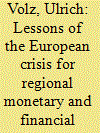| Srl | Item |
| 1 |
ID:
107598


|
|
|
|
|
| Publication |
2011.
|
| Summary/Abstract |
Most pundits argue the eurozone has only two options: break up or create a fiscal union to match its monetary one. In fact, there's a third, and better, path: adopt tighter market discipline, bailing out illiquid countries while letting truly insolvent ones go bust. The result would be a collection of fitter economies and a Europe strong enough to play a big role on the world stage.
|
|
|
|
|
|
|
|
|
|
|
|
|
|
|
|
| 2 |
ID:
086031


|
|
|
|
|
| Publication |
2009.
|
| Summary/Abstract |
"The common action was hailed as a success for 'Europe.' In reality . . . the EU's response to the crisis illustrates the limitations of trying to manage a monetary union without a fiscal union."
|
|
|
|
|
|
|
|
|
|
|
|
|
|
|
|
| 3 |
ID:
089260


|
|
|
|
|
| Publication |
2009.
|
| Summary/Abstract |
This article offers a survey of the literature on European Economic and Monetary Union (EMU), in particular works that deal with the question why EMU happened and, based on this literature, what one might be able to conclude about its sustainability. It reviews the literature by dividing up the analyses into four categories: those that explain EMU at the global and at the European Union (EU) levels of analysis, explanations at the national level, and explanations at the domestic level of analysis. The review suggests that EMU was a particular European response to global developments, which was possible because of existing EU institutions. EMU was causally motivated by a Franco-German deal, balancing national interests. Domestic motives reflect essentially opportunistic motives, and thus, cannot explain EMU. In our judgment the review suggests that Europe's single currency will remain sustainable as long as the Franco-German political deal sticks, the belief in the "sound money" idea remains hegemonic in Europe, and the losers from EMU are underrepresented in national and EU institutions. While opportunistic domestic motives cannot explain embarking on a long-term project, they can definitely be sufficient to derail such a project.
|
|
|
|
|
|
|
|
|
|
|
|
|
|
|
|
| 4 |
ID:
124090


|
|
|
|
|
| Publication |
2013.
|
| Summary/Abstract |
The debt crisis in several member states of the euro area has raised doubts on the viability of the European Economic and Monetary Union (EMU) and the future of the euro. While the launch of the euro in 1999 stirred a lot of interests in regional monetary integration and even monetary unification in various parts of the world, including East Asia, the current crisis has had the opposite effect, even raising expectations of a break-up of the euro area. Indeed, the crisis has highlighted the problems and tensions that will inevitably arise within a monetary union when imbalances build up and become unsustainable. This article discusses the causes of the current European crisis and the challenges that EMU countries face in solving it. Based on this analysis, it derives five lessons for regional financial and monetary cooperation and integration in East Asia.
|
|
|
|
|
|
|
|
|
|
|
|
|
|
|
|
| 5 |
ID:
132578


|
|
|
|
|
| Publication |
2014.
|
| Summary/Abstract |
The Association of South East Asian Nations (ASEAN) is among several regional blocs that have received praise from economists for making significant progress towards developing intra- and extra-regional economic relationships. However, opinions differ over the extent of ASEAN's potential for integration. This paper reviews the performance of and prospects for the group's intra- and extra-regional integration. It also reviews the performance of individual members in order to assess whether ASEAN integration could potentially lead to a monetary union in the future. We provide an overview of trade performance and a comparison of three macroeconomic variables: inflation; interest; and exchange rates. We observe that ASEAN members are in a favourable position to form a strong economic zone in the near future, but adopting a common monetary policy is less plausible.
|
|
|
|
|
|
|
|
|
|
|
|
|
|
|
|
| 6 |
ID:
186369


|
|
|
|
|
| Summary/Abstract |
European monetary policymakers face tough choices regarding the inflation and uncertainty fuelled by the war in Ukraine. They need to bring an end to the large-scale asset purchases and negative interest rates that have been the bulwarks of monetary-policy accommodation since 2015. They must also ensure that European monetary policy can be applied across countries while holding down the differences in sovereign borrowing costs between those governments that are financially strong, such as Germany, and those that are in a weaker position, such as Italy. Any solution to the problem of widening borrowing costs that is consistent with fighting inflation will impose losses on the central banks of stronger countries, while making it cheaper for those governments that receive support to borrow. Whatever it decides, the European Central Banks’s Governing Council does not have to be political to be perceived by the European public as making a political choice.
|
|
|
|
|
|
|
|
|
|
|
|
|
|
|
|